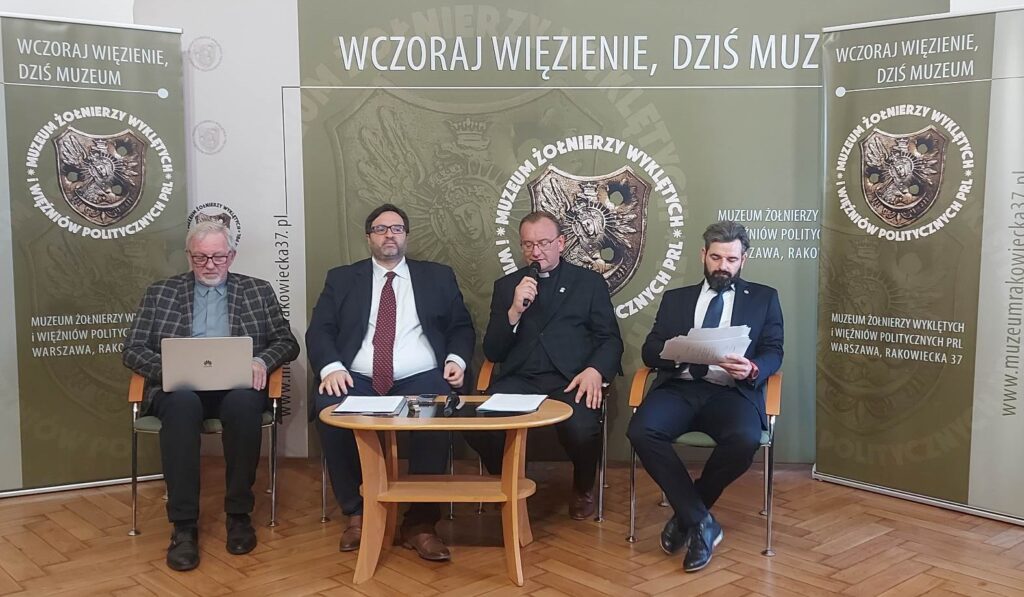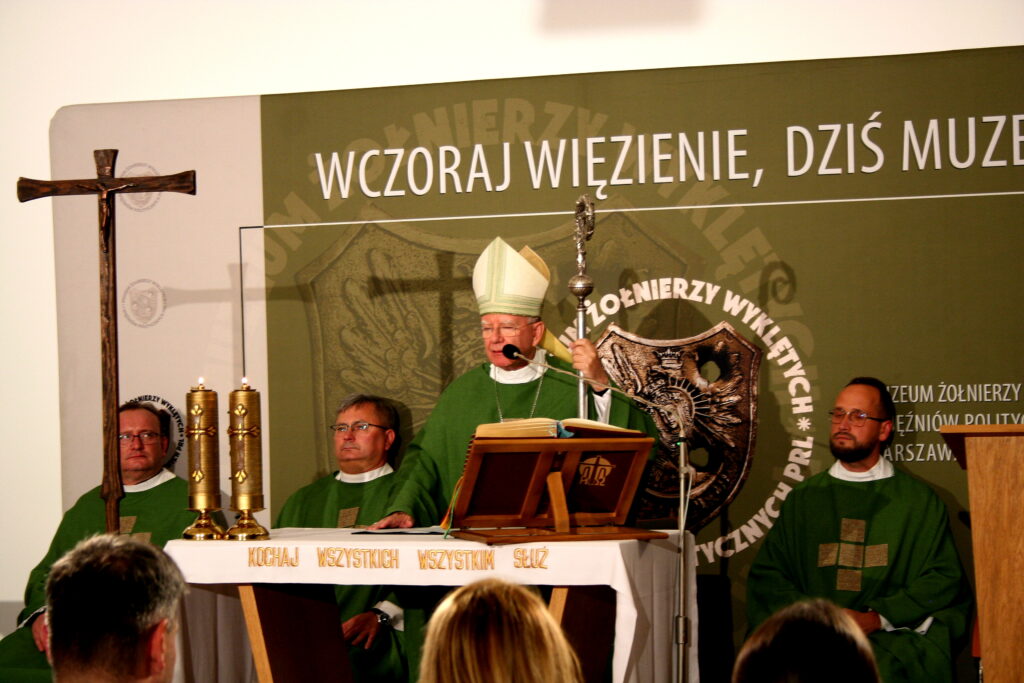
On September 25 and 26, 2023, the Museum of Cursed Soldiers and Political Prisoners celebrated the 70th anniversary of the imprisonment of Fr. Primate Stefan Wyszyński and Fr. archbishop Antoni Baraniak. The solemn Holy Mass was presided over by Fr. Archbishop Marek Jędraszewski, who in his homily recalled the figures of these steadfast priests, martyrs of the communist period in Poland.
Archbishop Jędraszewski in his homily emphasized that “we are celebrating the 70th anniversary of one of the most dramatic events in our recent history – the imprisonment of Cardinal Primate Stefan Wyszyński and with him his close, faithful collaborator, Bishop Antoni Baraniak, who was then the director of the Office of the Primate of Poland’s Secretariat”.
“Events take place at night. The light that the Primate of Poland was for the Polish society of that time was to go out. Once and for all. The darkness was also to encompass everything that made up these dramatic events in the late evening, night and morning of 25 and 26 September 1953. The point is not only that the public opinion was not supposed to learn about these events, but even that the darkness was supposed to prevail between the two heroes of those events, Primate Wyszyński and Archbishop Baraniak, and to some extent in this darkness they lived together for several years without knowing exactly what was happening to each of them” – he said.
The hierarch recalled that the testimonies about what the cardinal and bishop experienced were published only after their deaths. In 1982, Cardinal Stefan Wyszyński’s “Prison Notes” were published and in 2009 “Teczki na Baraniaka” (by Bishop Marek Jędraszewski – ed.). “The whole truth came to light and what was supposed to remain kept in darkness became light. The lights of Cardinal Stefan Wyszyński – the blessed of the holy, Catholic and apostolic Church, as well as Archbishop Antoni Baraniak – these lights are full of light today. Those who thought they had power, both those in power and those who were prison officers, have passed into the darkness of history. They are no longer remembered. Their names and surnames are recalled as a sign of shame and a warning” – the archbishop noted.
He said that the account of the arrest presented by Cardinal Stefan Wyszyński’s “Prison Notes” is very accurate and detailed. Archbishop Marek Jędraszewski quoted the words recorded by the Primate of the Millennium. Cardinal Stefan Wyszyński was visited by representatives of the authorities at night, presenting him with the government’s order to leave the city immediately. He was forced to do so and was forcibly transported to the Capuchin monastery in Rywałd. “I was left alone. On the wall, above the bed, there is a painting with the inscription: ‘Our Lady of Rywałd, comfort the distressed’. It was the first friendly voice that caused great joy. After all, what happened was what I was threatened so many times: pro nomine Jesu contumelias pati (For the name of Jesus, endure insults)” – wrote Cardinal Stefan Wyszyński.
Archbishop Marek Jędraszewski also recalled the report of Archbishop Antoni Baraniak, related to these dramatic moments. The primate’s chaplain went out to the garden late to freshen up and say the rosary. He then saw the robbers jumping over the wall and running to the front of the building. One of them aimed at the bishop Antoni Baraniak, threatening to shoot him. When the bishop was allowed into the house, he witnessed the unbecoming behavior of the employees of the Security Office towards the primate. A moment before he was led out of the house, Cardinal Stefan Wyszyński gave his secretary all the necessary powers. Then the authorities’ envoys took the bishop Antoni Baraniak to the secretariat, where they searched for several hours. The sounds of violent searching, bangs and breaking walls could be heard throughout the building. Three documents prepared two months later by UB officers show that 290 documents were taken from the Secretariat of the Primate of Poland. They became the basis for extremely detailed interrogations to which Bishop Baraniak was subjected during his stay in the Mokotów prison.
Only in the morning it was decided that the cardinal’s secretary would be taken to the prison on Rakowiecka Street. Archbishop Marek Jędraszewski read the memories of Archbishop Antoni Baraniak from that day, which end when he is thrown into a cell: “I was taken to an empty concrete cell with a bunk, a stool, a jug of water with a basin and a toilet. A huge key creaked menacingly in the iron door, and finally there was silence. The gloomy morning of September 26, 1953, looked down through the barred window and the frosted thick glass”. Bishop Baraniak did not tell even his closest relatives about what he experienced in prison, and he was brutally tortured there. Only fragments of memories remain, a few testimonies of what he had to endure. His imprisonment lasted from September 26, 1953 to December 29, 1955. In his case, conducted by the Security Office, 284 people appeared, and 145 interrogation reports have been preserved, which do not mention the torment endured by the cardinal’s secretary.
Probably something happened between January 29 and March 31, 1954 that dramatically affected Bishop Baraniak health. It seems that it was then that the authorities responsible for the investigation decided to use “stricter investigative methods” against him. An outstanding historian, Fr. prof. Marian Banaszak in his memories related to Bishop Antoni Baraniak noted: ‘He actually became a martyr for the cause of the Church. When he was imprisoned, I think it was generally known, at least by the priests, that he was to be a key witness in the trial against Primate Wyszyński. And that is why in the prison [in Mokotów] in Warsaw they tried to get him to testify. That’s why he had a very strict investigation and examination. But since he didn’t want to say anything against the Primate, he couldn’t say anything, because it would all be untrue, what was wanted from him, so he was practically tortured. The historian said that years later, Archbishop Antoni Baraniak opened himself up to a small group of Polish priests in Rome. The Archbishop then recalled that when they could no longer persuade him to testify against the Primate, they were kept in prison. He was locked without clothes for over a week in a windowless cell with water dripping from the ceiling and walls. He didn’t break down. He said that during his stay at Rakowicka Street, he and other prisoners made retreats, praying never to break down. “Then he made a resolution that whatever happened to him, he would never testify against the Primate and that he was ready to give his life for the cause of the Church. It was during this meeting in Rome that he emphasized that it was such help and strength for him. And it stayed that way. Steadfast” – recalled Prof. Marian Banaszak.
In his homily, Archbishop Marek Jędraszewski also recalled a conversation he had with Fr. Dr. Henryk Grześkowiak, a long-time prefect at the Archbishop’s Seminary in Poznań. During his stay at the Poznań seminary, the seriously ill Archbishop Antoni Baraniak suddenly began to remember the times he spent in prison in Mokotów. He said then that he was repeatedly thrown into a dark room where he did not know whether it was day or night. He was dragged out of the room and given papers to sign, accusing the Cardinal Stefan Wyszyński and admitting to working with agents of hostile countries. In these situations he said to himself: “Baraniak, you can’t get cracked”.

Archbishop Jędraszewski also recalled the memories of Dr. Milada Tycowa, who had to look at the archbishop Antoni Baraniak’s back during a medical examination. She reported: “The Archbishop was a bit reluctant to show the back, but this basic examination was necessary. After a while, it turned out that the entire surface of the back was covered with large scars that must have been the result of beatings. It was a devastating sight. Knowing that the Archbishop had been in a communist prison many years earlier, I couldn’t stand it and asked: ‘And this is a souvenir here, right?’ To which the Archbishop replied only: ‘Yes, a souvenir’. Fr. Dr. Jarosław Wąsowicz – for the Primate of Poland, Cardinal Stefan Wyszyński – said that “here, in the Mokotów prison, Archbishop Baraniak suffered for the entire Church”.
Archbishop Baraniak did not regain full freedom or health until the end of his life. However, he was not the only clergy victim of the criminal communist system. During the scientific conference “Unbreakable Church Leaders in the Times of Communism”, Fr. Dr. Jarosław Wąsowicz – incidentally the author of the biography of Archbishop Antoni Baraniak – introduced the figures of Salesian martyrs from the communist countries of Central and Eastern Europe, including István Sándor, who conducted a secret apostolate among young people and did not abandon Hungary, even though he was advised to evacuate from that country. “He became a secret youth pastor, their mentor, their spiritual guide. All this happened under the watchful eye of the secret security and over time he began to be in mortal danger” – Father Dr. Wąsowicz said, recalling that when “the noose was already tightening around his neck” he decided to leave Hungary and even crossed the border, but he felt remorse, that he failed these young people and returned to Budapest and was arrested by the communists. After a brutal investigation, in which he did not betray any of his charges, he was sentenced to death. The sentence was carried out on June 8, 1953. In 2013, he was included in the group of the blessed.
The historian emphasized that when the persecution of Salesians in the countries of Central and Eastern Europe continued, both Cardinal Stefan Wyszyński and Archbishop Baraniak came to their aid, including: conducting secret priestly and religious ordinations. “Our brothers tried to support the Salesians through various private contacts, either with literature or by taking secret vows – at railway stations and beaches” – he said.
The following panels recalled the priests of the Archdiocese of Krakow who were imprisoned during the communist dictatorship, as well as the profiles of other martyrs: Father Tomasz Roztworowski (TJ), Fr. Zygmunt Kaczyński and Fr. Rudolf Marszałek (TChr).
Anna Wiejak
